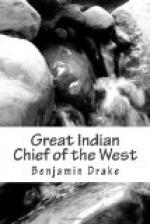William Henry Harrison.
L.S.
LAYOWVOIS, or Laiyuva, his
X mark. L.S.
PASHEPAHO, or the Stabber,
his X mark. L.S.
Quashquame, or jumping
fish, his X mark. L.S.
OUTCHEQUAHA, or sun fish,
his X mark. L.S.
HASHEQUARHIQUA, or the bear,
his X mark. L.S.
In presence of
William Prince, Secretary
to the Commissioner.
John Griffin, one of the Judges
of the Indiana Territory.
J. Bruff, Maj. Art’y.
U.S.
Amos Stoddard, Capt. corps
of Artillerists.
P. Choteau, Agent de la haute
Louisiana, pour le department sauvage.
Ch. Gratiot.
Aug. Choteau. Vigo.
S. Warrel, Lieut. U.
States Artillery.
D. Delaunay.
Joseph Barren.
} sworn
H’polite Bolen, his
X mark. } Interpreters.
On the 31st of December 1804, the President of the United States, submitted this treaty to the Senate for their advice and consent, and it was by that body duly ratified.
In a Life of Black Hawk, dictated by himself and written by J.B. Patterson, to which there is a certificate of authenticity appended from Antoine Le Clair. U.S. interpreter, for the Sacs and Foxes, under date of 16th October 1833, there is the following statement concerning the manner in which this treaty was made.
“Some moons after this young chief (Lieutenant Pike) descended the Mississippi, one of our people killed an American, and was confined, in the prison at St. Louis for the offence. We held a council at our village to see what could be done for him—which determined that Quash-qua-me, Pa-she-pa-ho, Ou-che-qua-ha, and Ha-she-quar-hi-qua, should go down to St. Louis, and see our American father, and do all they could to have our friend released; by paying for the person killed, thus covering the blood and satisfying the relations of the man murdered! This being the only means with us of saving a person who had killed another, and we then thought it was the same way with the whites.
“The party started with the good wishes of the whole nation, hoping they would accomplish the object of their mission. The relations of the prisoner blacked their faces and fasted, hoping the Great Spirit would take pity on them, and return the husband and the father to his wife and children.
“Quash-qua-me and party remained a long time absent. They at length returned and encamped a short distance below the village, but did not come up that day, nor did any person approach their camp. They appeared to be dressed in fine coats and had medals. From these circumstances, we were in hopes they had brought us good news. Early the next morning, the council lodge was crowded—Quash-qua-me and party came up, and gave us the following account of their mission.




